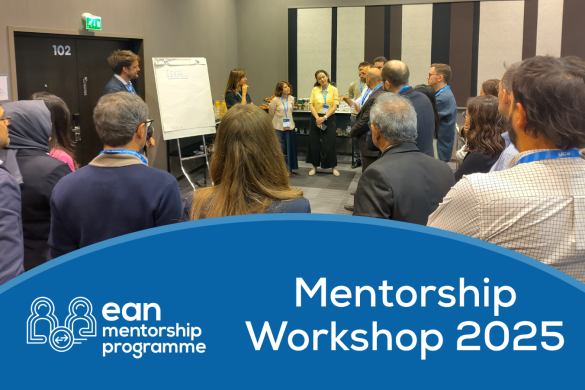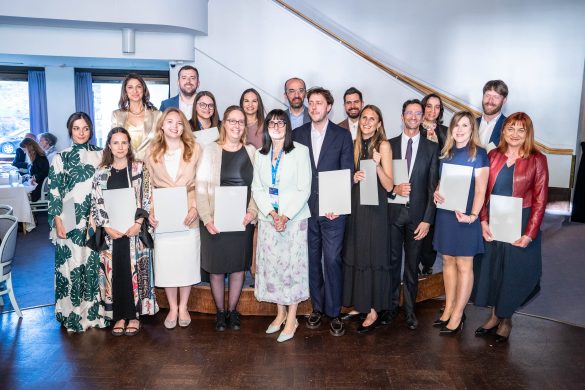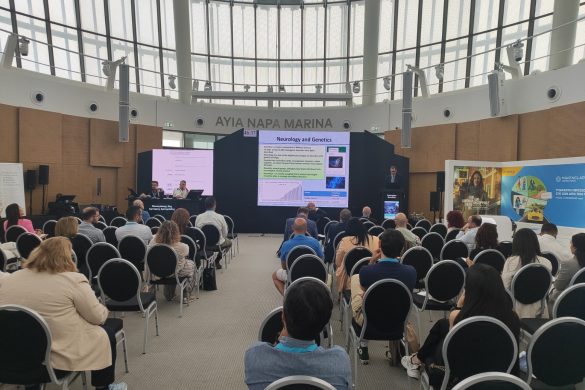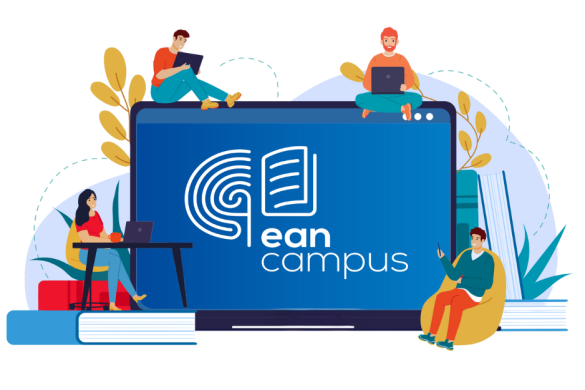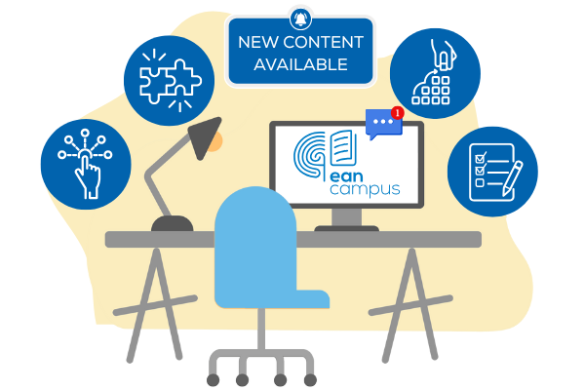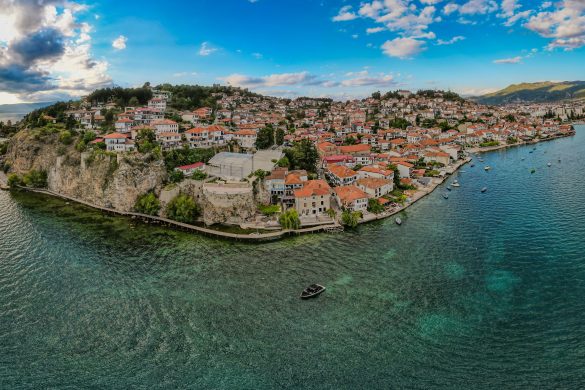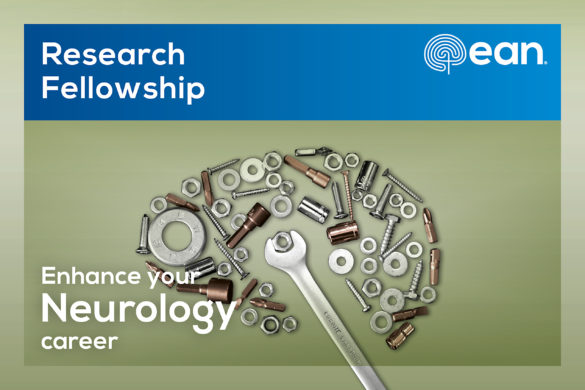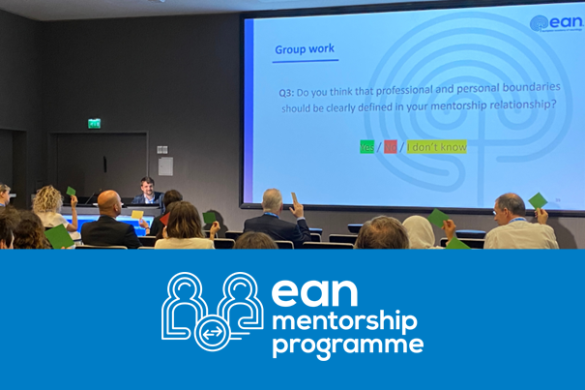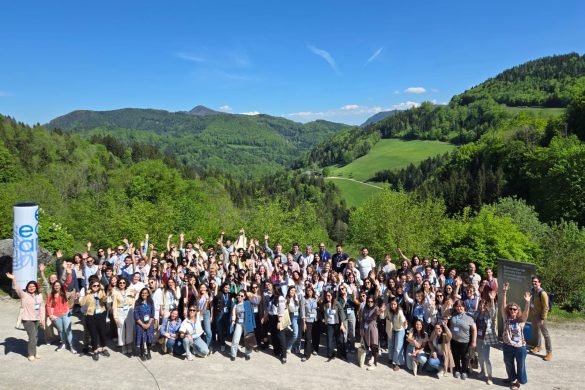During 20th and 23rd of June 2015, Berlin was the capital of European neurology. At the 1st Congress of European Academy of Neurology, young neurologists had a session specially organized for them by the European Association of Young Neurologists and Trainees (EAYNT) on 23rd of June. During this Special Session of EAYNT, special tips on study design, mentorship in career, EBN examination and news about Neuropenews and EAN website were offered to young neurologists by world renowned speakers. The audience was honoured to listen to Prof. Maurizio Leone, Prof. Joseph Jankovic, Prof. Jan Kuks, Prof. Elena Moro and Prof. Tim von Oertzen.
In the first lecture, Prof. Maurizio Leone from Department of Neurology, Ospedale Maggiore della Carità, Novara, head of the Multiple Sclerosis Centre shared valuable ideas on study design. He started the talk by asking how many of the young neurologists designed a study on their own and identifying that only a few of them had.
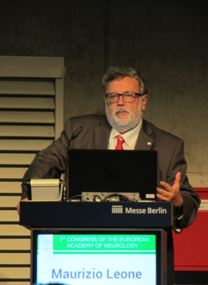 Prof. Leone pointed out that reliability and accuracy are very important in the design of a study. Regarding reliability of a study, which can be interobserver or intraobserver, he presented kappa statistics, an easy to understand statistical method used to test agreement between observers. The first decision when designing a study is whether altering events under study is intended, differentiating experimental studies when an intervention is applied from observational studies. As observational studies, cross sectional studies represent a snap shot of a particular moment in time, having the advantage of easily available data, being good for generating hypothesis, but there is no control on the exposure and clear interpretation is difficult. Study designs for analitycal epidemiology include retrospective (case-control) studies and prospective (cohort) studies. Prof. Leone explained in a very comprehensive way the differences and advantages and disadvantages between retrospective and prospective studies.
Prof. Leone pointed out that reliability and accuracy are very important in the design of a study. Regarding reliability of a study, which can be interobserver or intraobserver, he presented kappa statistics, an easy to understand statistical method used to test agreement between observers. The first decision when designing a study is whether altering events under study is intended, differentiating experimental studies when an intervention is applied from observational studies. As observational studies, cross sectional studies represent a snap shot of a particular moment in time, having the advantage of easily available data, being good for generating hypothesis, but there is no control on the exposure and clear interpretation is difficult. Study designs for analitycal epidemiology include retrospective (case-control) studies and prospective (cohort) studies. Prof. Leone explained in a very comprehensive way the differences and advantages and disadvantages between retrospective and prospective studies.
Next, he presented cohort studies which have the best study design regarding prognosis. Association is the very important aspect that is to be studied in cohort studies. He explained also the methods to study strength of association and their relevance: odds ratio and relative risk. He furthermore explained the pros and cons of experimental studies. A comparison between experimental and observational studies was made with focus on definition of confounder, internal validity and external validity.
Case reports and case series were also presented and Prof. Leone advised us to follow CARE guidelines (consensus-based clinical case reporting guidelines). As a conclusion, the speaker presented an article from Lancet 2014 regarding methods to improve research design and analysis and reduce waste of resources.
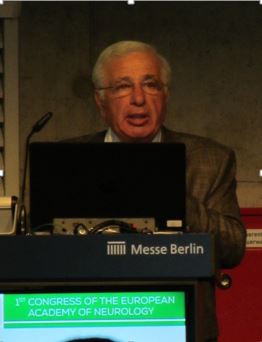 The following speaker was prof. Joseph Jankovic, Professor of Neurology, Distinguished Chair in Movement Disorders Director, Parkinson’s Disease and Movement Disorders Clinic, Department of Neurology, Baylor College of Medicine Houston, Texas, who shared interesting and valuable ideas on the role of a mentor in life and career. Prof. Jankovic started the lecture with examples of mentors in medical science throughout time – The Anatomy Lesson of Dr. Nicolaes Tulp by Rembrandt, Un Lecon Clinique a la Salpetriere by Andre Brouillet; he also mentioned some of his mentors at Columbia University. Mentor was defined as a person teaching or offering help to someone less experienced or younger. Anecdotally, he mentioned that a mentor is not a tormentor. Next, the speaker presented the ingredients of happy success: empathy, integrity, curiosity, ambition, anticipation, perseverance, luck, a supportive partner and keeping in mind that family always comes first. Also, developing and maintaining high EQ by having positive attitude, showing appreciation, smiling, identifying constructive solutions, working ethically contributes to success.
The following speaker was prof. Joseph Jankovic, Professor of Neurology, Distinguished Chair in Movement Disorders Director, Parkinson’s Disease and Movement Disorders Clinic, Department of Neurology, Baylor College of Medicine Houston, Texas, who shared interesting and valuable ideas on the role of a mentor in life and career. Prof. Jankovic started the lecture with examples of mentors in medical science throughout time – The Anatomy Lesson of Dr. Nicolaes Tulp by Rembrandt, Un Lecon Clinique a la Salpetriere by Andre Brouillet; he also mentioned some of his mentors at Columbia University. Mentor was defined as a person teaching or offering help to someone less experienced or younger. Anecdotally, he mentioned that a mentor is not a tormentor. Next, the speaker presented the ingredients of happy success: empathy, integrity, curiosity, ambition, anticipation, perseverance, luck, a supportive partner and keeping in mind that family always comes first. Also, developing and maintaining high EQ by having positive attitude, showing appreciation, smiling, identifying constructive solutions, working ethically contributes to success.
Prof. Jankovic gave mindful advice from several books on mentorship and leadership: although we are taught more methods to achieve a successful career (resume virtues), there are also eulogy virtues – human values like honesty, kindness – that we need to grow inside (David Brooks); be a good listener and interested genuinely in other people (Dale Carnegie); think boundlessly, work purposefully, live passionately (Daniel Lubetzky). Next, Prof. Jankovic explained the attributes of a successful academic physician: following goals, always carrying a pen and paper to write down ideas, prioritizing projects, not wasting time, multitasking, learning scientific methodology, grant writing skills, applying for grants, not getting discouraged by failures, choosing the professional environment and mentor based on performance and not geographically, ”publish or perish”.
Regarding publishing, the speaker highlighted some important aspects that are to be taken into account: the order of authors, the aim of article, the target audience, writing in an accessible manner, learning from editors, reading actively and critically.
For a successful physicians, some key characteristics would be availability, affability and ability. The speaker advised us to practice an individualized medicine and make the patient feel the center of universe of the physician.
Prof. Jankovic also discussed the physician burnout that is quite high in neurologists and the pressure on the physician coming also from the judgement passed by patients. Next, the speaker mentioned an article from Ann Neurol 2014 about small issues that professionals need to face in academic neurology, which include: internal rivalries, politics, meetings one has to attend, unproductive or counterproductive staff, outmoded procedures, patient, family, community demands, fundraising, interaction with media.
Prof. Jankovic then presented the AAN Emerging Leaders Forum designed to identify and cultivate future leaders of the professional association. Up to 12 applicants are selected for the 10 months mentoring programme.
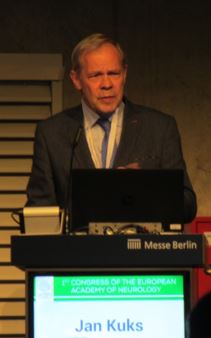 The following speaker was Prof. Jan Kuks from University Medical Center Groningen, Head of the Examination Committee at the Section neurology, UEMS, chairman of the EAN Sub-committee on Quality Assurance who offered valuable information on the European Board Examination. It is a part of a process to set some harmonized standards in the training of neurology residents across Europe. This examination is available for other specialties as well and candidates outside Europe are welcome too. There is also an admission fee as it is really an expensive enterprise.
The following speaker was Prof. Jan Kuks from University Medical Center Groningen, Head of the Examination Committee at the Section neurology, UEMS, chairman of the EAN Sub-committee on Quality Assurance who offered valuable information on the European Board Examination. It is a part of a process to set some harmonized standards in the training of neurology residents across Europe. This examination is available for other specialties as well and candidates outside Europe are welcome too. There is also an admission fee as it is really an expensive enterprise.
Prof. Kuks pointed out that the aim is not only testing dry knowledge, but also other competencies and the examination is intended to test competencies in daily llife and practice, not only a snapshot of the exam day. The majority of the question of the examination are taken from eBrain (electronic courses of EAN), European guidelines of EAN, Adam’s and Victor’s Principles of Neurology.
This year’s exam consisted of 20 MCQs closed book on studied Guidelines, 20 MCQs closed book ready knowledge, 40 MCQs open book handling knowledge, 48 EMQs open book problem solving, essay on Public Health or Ethics and critical appraisal of a science topic. In 2015, 63 candidates took the exam, which is a relatively low number compared to other specialties. Prof. Kuks showed some statistics regarding the results and the distribution of candidates over years and by countries.
Regarding the opinion of candidates about the exam, Pof. Kuks highlighted that most of them were satisfied with the idea of having closed and open book questions, with having both written and oral part of examination and with the degree of difficulty and the general experience of the exam.
Prof. Kuks mentioned in the end the desire to attract more candidates from more countries in the years to come.
Prof. Elena Moro, Neuropenews editor-in-chief and Professor of Neurology at University of Grenoble presented changes in Neuropenews. Prof. Moro mentioned that one of the main objectives is to develop networks for some selected groups like young neurologists or professionals from specialties related to neurology. It should help them meet, share and exchange ideas, disseminate information, knowledge, interests, passion, enable communication and collaboration.
There is also planned to present the Case of the month, the Paper of the Month. Prof. Moro shared the idea of starting a virtual tour of Europe in which the Country of the month can present itself and the Case of the month, show academic and research opportunities for neurologists interested in fellowships.
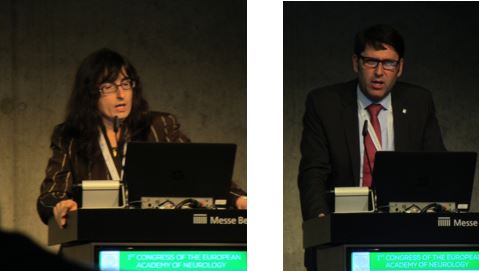 Prof. Tim von Oertzen, EAN Website editor-in-chief and Head of Department of Neurology at the Wagner-Jauregg Neuroscience Centre in Linz, presented the changes that are planned for the EAN website. The website is currently in different phases of development and is due to be finalized in a couple of months. Prof. von Oertzen mentioned the idea of a mentoring programme that could be facilitated by the website as well. He presented the plan of the section of the website as a tree with branches, integrated areas member being a very important part of it. He also showed a very impressive dynamic presentation of the website. Neuropenews and European Journal of Neurology are incorporated within the portal of the webpage. There will also be included a social platform, space where people can discuss and exchange ideas.
Prof. Tim von Oertzen, EAN Website editor-in-chief and Head of Department of Neurology at the Wagner-Jauregg Neuroscience Centre in Linz, presented the changes that are planned for the EAN website. The website is currently in different phases of development and is due to be finalized in a couple of months. Prof. von Oertzen mentioned the idea of a mentoring programme that could be facilitated by the website as well. He presented the plan of the section of the website as a tree with branches, integrated areas member being a very important part of it. He also showed a very impressive dynamic presentation of the website. Neuropenews and European Journal of Neurology are incorporated within the portal of the webpage. There will also be included a social platform, space where people can discuss and exchange ideas.
Prof. von Oertzen highlighted areas particularly important for young neurologists: Resource centre (eBrain, information about educational activities of EAN such as teaching courses, programmes that EAN offers, guidelines, CME via European Journal of Neurology which is free for members); Scrientific; Liaison and neworking.
There still are many challenges regarding features of website, its programming. Ideas, suggestions and feedback from users about the beta version are all welcome. The new website will be www.ean.org and it will be availavle on all devices.
During the session, participants had also the opportunity to address questions and discuss with the speakers. It was a session in which young neurologists had a lot to learn from valuable personalities. We are looking forward to seeing you next year in Copenhagen!
Monica Moarcas (from Romania) on behalf of the European Association of Young Neurologists and Trainees (EAYNT)




